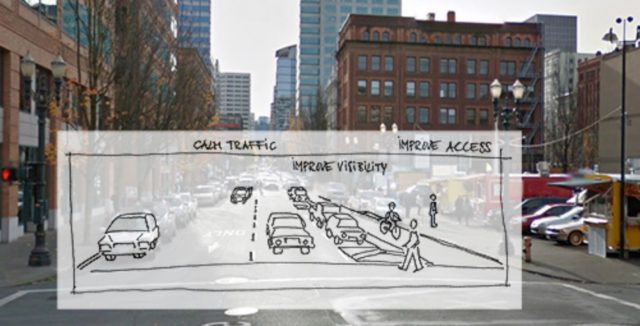
(Images: City of Portland)
The City of Portland Bureau of Transportation will make significant changes to 2nd and 3rd Avenues in downtown Portland this summer.
2nd, which is one-way northbound, will be re-striped with a parking-protected bike lane from SW Stark to NW Everett and there’s a new public plaza coming to the intersection of SW Ankeny and 3rd.
The changes come as a direct follow-up and complement to last year’s buffered bike lanes and new crosswalks on 3rd Avenue. The project will complete a north-south couplet on two streets that were previously striped without dedicated space for cycling.
PBOT hasn’t made any official statements about the 2nd Avenue or the Ankeny Alley plaza projects. Details were quietly released on their website yesterday.
According to the site, which calls this the “2nd Avenue Road Reconfiguration Project,” PBOT explains that the impetus comes from the same place as the 3rd Avenue changes: The Old Town Chinatown Community Association. After new bike lanes and crosswalks went in on 3rd, they wanted a similar treatment for 2nd. When PBOT did a traffic analysis on 2nd they felt a bike lane could be created with “no significant increase in delay for motor vehicle operators.” (Why they feel the need to justify these projects with that framing is beyond me. A city where people can drive without delay is not a goal stated in any adopted plans.)
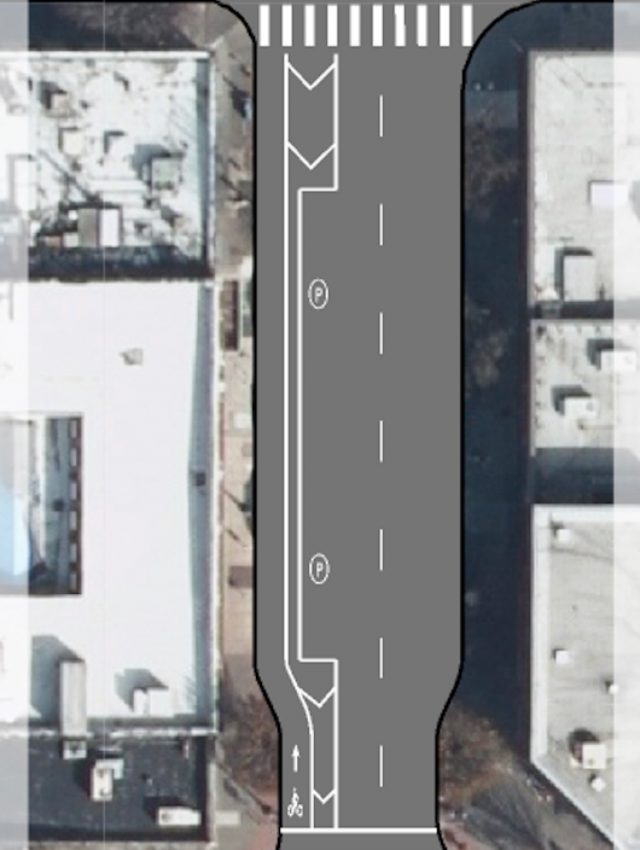
Advertisement
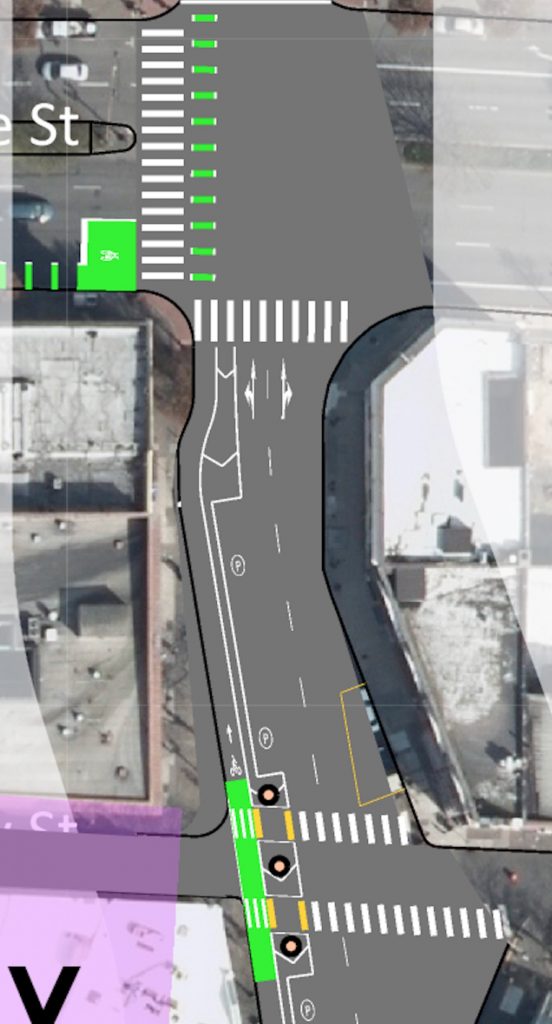
The existing cross-section on 2nd is typical of downtown Portland: three conventional travel lanes and two lanes for on-street parking. The new cross-section will include two conventional lanes, one bike-only lane (on the left side of the street), and two parking lanes. One of the parking lanes (on the right side) will remain with the parking lane on the west side of the street will become a “floating” lane that will separate the new curbside bike lane from the conventional lane. This parking-protected bike lane is the exact same design that was successfully piloted by Better Block PDX on their Better Broadway project one month ago.
Keep in mind it was Better Block that started this momentum. They first transformed 3rd Avenue with temporary barricades and hay bales in October of 2014 and PBOT has been capitalizing on the success of that project ever since.
In addition to the new lane configuration, the 2nd Avenue project will prohibit auto parking adjacent to some intersections in order to make them safer to cross. Because the City feels the need to do these projects without reducing any parking capacity (similar to how they prefer to not reduce auto travel times), PBOT will maintain the overall number of parking spaces by fitting more cars onto other parts of the street.
PBOT says the project will improve safety for everyone thanks to lower driving speeds and upgraded spaces for people on foot and on bikes.
And to add to this new 2nd and 3rd Avenue couplet, PBOT is working with business owners through the Ankeny Alley Association to create a new public plaza on 3rd between Burnside and Ash. The plaza will extend out from the popular destination of Voodoo Doughnuts and will line up wit the existing carfree street that was created on Ankeny in 2011. Last March we shared some initial designs of what the plaza might look like.
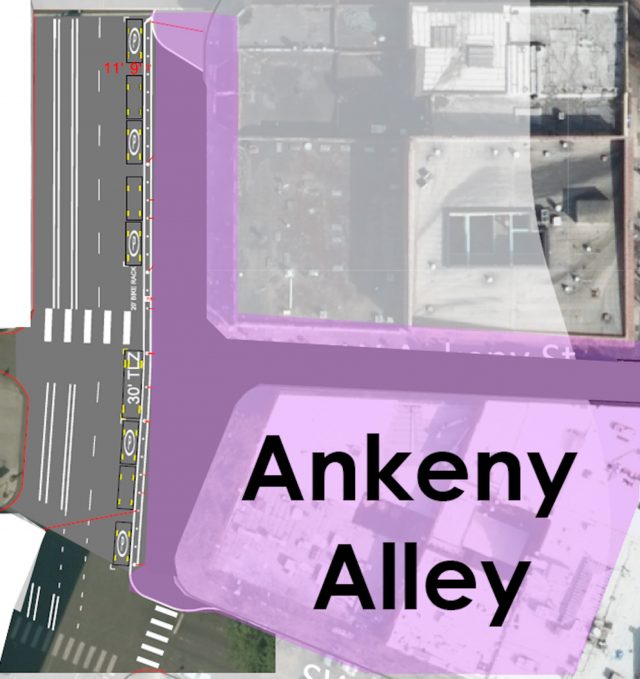
These projects are expected to be completed by mid-to-late July.
To share feedback on this project and/or to get involved in future planning efforts in this area, email the Old Town Chinatown Community Association Transportation & Mobility Committee at OTCTmobility@gmail.com.
— Jonathan Maus, (503) 706-8804 – jonathan@bikeportland.org
Our work is supported by subscribers. Please become one today.



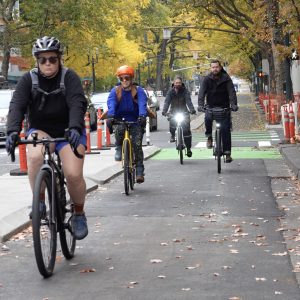

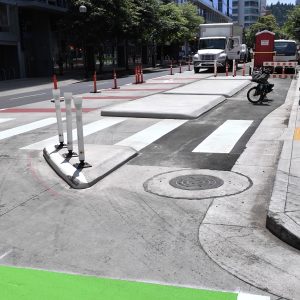
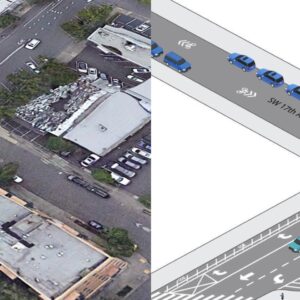
Thanks for reading.
BikePortland has served this community with independent community journalism since 2005. We rely on subscriptions from readers like you to survive. Your financial support is vital in keeping this valuable resource alive and well.
Please subscribe today to strengthen and expand our work.
That looks good!
I imagine there will be an initial period during which drivers learn where to park, with some continuing to park curbside. But people will figure it out.
Can you tell from the drawings how wide the parking-protected bike lane will be? Enough that it’s not a de facto door zone?
Eventually, it would be nice to see the bike lane extend further south than Stark. You should be able to come off the Hawthorne Bridge, turn right on 2nd, and ride in the bike lane all the way into Chinatown. Ditto the southbound direction on 3rd.
Is PBOT/fire chief going to insist that the no parking zones at the end of some blocks be kept clear for large vehicles to turn? Or can we use the space for bike corrals/bike share docks?
For 2nd Ave, why not all the way from Stark to Glisan?
Probably because putting in a bike lane there wouldn’t leave enough room for parallel parking on the west side and 60 degree angled parking on the east side between Everett and Flanders.
Because 2nd Ave dead ends into a one way Glisan that doesn’t connect to much? This:
https://goo.gl/maps/S3NUGVy49iB2
to what end?
Surely you’ve heard of something called the “Flanders Street Greenway”.
I’m glad that PBOT is finally going to build a northbound bike lane through Downtown, but its position on the left hand side of the street worries me. Many of the people who will be using this bike lane will be heading out of Downtown to the east side of the river. The configuration shown will make it really difficult to turn right from 2nd onto the Burnside Bridge.
I see your point. However, the left side lane will also allow people heading West over the bridge to easily continue West after the jog on 2nd.
It may be possible to mitigate problems with the design south of Burnside by making a few small changes. Splitting the N-bound bike lane at the approach to Burnside can separate right turners and allow them some space. This lane clearly needs physical separation at Burnside or cars will be using this space. PBOT… Changing the crossing signal to prioritize ped traffic and delay car traffic across Burnside can also help with this.
I think that’s what the bike box is for on the right lane of Burnside. You essentially do a Vancouver-style turn into the bike box, then wait for the light, then go up the bridge. Creates a time delay for the experienced rider used to turning around stopped cars from the right lane, but probably a significant safety improvement for anyone else, and avoids any right hooks at that intersection.
The bike box could often be filled up with traffic coming from 3rd and turning onto Burnside from there. I think there needs to be a separate bike box in the buffered area between the motor vehicle lane and the bike lane for eastbound bikes (that are not down).
Potential over-reliance by some people that ride, on too much bike specific infrastructure, may be a downside of some of these kinds of projects. I question some, whether many people riding, or that will come to ride 2nd, really need a bike lane on this street, to safely and comfortably travel the street. Compared to 3rd, 2nd seemed to me to be an easier, lower volume, slower traffic street to ride…though I’m not absolutely certain about that.
The more they’re installed on streets and used, people likely will get more used to left side bike lanes…both people that ride and people that drive. Regardless though, of which side of the street the bike lane is located on one way streets, people riding, that have turns off the street in mind for their route…need to have acquired and use, the skills to effectively display hand signals to indicate their desire to turn.
That’s a skill and practice that many people riding may be very deficient of. Given that people biking, comparatively, already are vulnerable road users relative to motor vehicle traffic, not having and using hand signal skills effectively is self defeating. Bike specific infrastructure can’t be relied on to sufficiently compensate for such lack of riding in traffic skills.
I’m glad though, to see the city trying new ideas supportive of travel by bike. And…the pedestrian plaza over on 3rd and Ankeny could be a great asset to the area, making the area a much more appealing area to be than it is now, as well as being far more beautiful than the parking lot.
Copenhagen right (2 stage at the bike box)
Two problems with this:
1) Denmark drives on the right, and therefore places its bike lanes on the right. If we’re using Copenhagen as the precedent, can you point to built examples of “Copenhagen rights” in Copenhagen?
2) In Copenhagen the left turning area is in the line of travel. In this design a right turning cyclist would have to turn westbound on the eastbound side of Burnside to get into the bike box. That is so counter-intuitive that I doubt anyone will ever do it.
Is that so different from having cyclists coming from the path under the harbor drive viaduct turn right to pull into the bike box on sw river parkway in order to go left on harrison?
https://www.google.com/maps/@45.5074031,-122.67573,3a,75y,351.36h,69.77t/data=!3m6!1e1!3m4!1sUGiHhFxdqp1NYhXVcZcDHw!2e0!7i13312!8i6656
I wouldn’t describe that condition as successful. Particularly when cars are up to the stop line at a red light, it’s difficult to get into the box. And the bike box shown above requires a longer distance of out-of-direction travel.
The bike box shouldn’t be on the other side of the crosswalk, causing conflicts with pedestrians. This is not good design.
As an aside, why was there no public process for this? It doesn’t look like anybody other than the Old Town Chinatown Community Association was consulted. It’s confusing to me how some projects take years to implement because of a ridiculously excessive amount of public process, while others are done with no process at all. Some middle ground perhaps?
I like these left side bike lanes if they’re continuous and span many blocks like on SW 5th but I wouldnt worry about being required to use this one on 2nd until it gets longer. ORS 814.420 is not really enforceable since riders have different abilities and ways to “prepare to execute a right turn.” Just be ready to explain your situation and remember you’re not required to ride in ANY BIKE LANE if you encounter a hazardous condition or debris.
PBOT has posted drawings of an updated design for the project. I’m still not thrilled that it’s going to be on the left hand side, but the changes do address a lot of the concerns.
https://www.portlandoregon.gov/transportation/article/579724
I like this design, though would prefer concrete instead of paint. Any word on if PBOT will be at least installing plastic bollards in the buffer area?
>“no significant increase in delay for motor vehicle operators.” (Why they feel the need to justify these projects with that framing is beyond me. A city where people can drive without delay is not a goal stated in any adopted plans.)
From the draft 2035 comprehensive plan.
“Policy 9.39 Automobile transportation. Maintain acceptable levels of mobility and access for private automobiles while reducing overall vehicle miles traveled (VMT) and negative impacts of private automobiles on the environment and human health.”
Serious question. What level of delay is compatible with maintaining acceptable levels of mobility?
They did not say ‘no delay’ they said ‘no increase in delay’, meaning no harm, no foul.
Yes, that’s what I meant. What level of increase in delay for drivers as part of a bike/ped/transit project will start to conflict with maintaining acceptable levels of mobility and access for private automobiles?
Tell me, how many of the cycling deaths over the past couple of years involved overtaking vehicles striking cyclists in a standard (non-door-zone) bike lane or even in a sharrow (marked or not) and how many involved cyclists being struck in intersections? Just from the press coverage, it looks like the latter vastly outnumber the former, and yet here we are with people getting excited about a buildout that increases the intersection risks (and may increase the dooring numbers).
It may be time to leave the group-think behind.
Yeah, disappointed to not see a protected intersection design here.
But those intersection deaths occurred on streets with standard bike lanes. Do you have any studies showing that protected bikeways increase the likelihood of intersection collisions?
I can think of several deaths in outer-SE Portland that would have been prevented by parking-protected bikeways. The question is whether or not there would be an increase in intersection collisions, and if that increase would outweigh the decrease in dooring cases, or other collisions that occur in standard bike lanes.
For 2003-2012 (a rational period of review) fatal geometry (non specific facility):
8 turning
2 angle
4 rear end
2 head on
4 sideswipe/overtaking
So maybe 10 intersectional – 55% (road or driveway) versus 8 from behind – 45%.
Injury geometry:
1235 turning
855 angle
83 rear end
11 head on
125 sideswipe/overtaking
Sigh…, I don’t know about everyone else, but I’m really uncomfortable riding on the left hand side of the road. Drivers don’t seem to expect cyclists on that side of the road.
Me too. Imagine if the city had various streets where suddenly cars drove on the left side of the road instead of the right. Confusing for everyone.
check out the Diverging Diamond Interchange (DDI):
http://www.ask.com/youtube?q=DIVERGING+DIAMOND+INTERCHANGE&v=HD-0QnUlLOQ&qsrc=472
The diverging diamond interchange is really awesome if you want to give bikes and peds the lowest priority possible.
I am uncomfortable riding on either side of the road until they ban motor vehicles from turning across the bike lane; I much prefer to take the middle lane on these streets.
I’m excited by more separated lanes of travel (yay!), but the more I look at the drawing, the more questions I have about 2nd.
This reconfiguration, as drawn, doesn’t seem very functional for me personally. The big bike box on Burnside at 2nd — what is it for? I think of those types of boxes as being in places where the focus is preventing right hooks, but… there’s no right turn there.
I head north on 2nd to get on the Burnside Bridge as my usual route home from downtown, and I agree with maccoinnich. The lack of the right-turn bike box onto Burnside and all the obstacles to moving over to the right lane mean I’d likely move into the far right lane blocks back, maybe as far back as Stark, depending on how easy the lane change ends up being.
I’m already imagining the fun of dealing with drivers who would get frustrated with me for taking one of “their” lanes after they “gave up” a lane to bicycles.
North on 2nd to the Burnside Bridge is my route home everyday too. My guess is that the big bike box on Burnside is for some jug-handle monkey business for riders that wish to head east across the bridge.
This is a terrible idea. There’s a very busy bus stop right at the corner where the plans show the bike box. I’m dang sure not going to jug-handle myself right in front of the bus. Just put the stupid protected lane on the right side, or don’t do it at all.
If this gets built as shown, we really need to repeal the mandatory sidepath law. I will not ride there, and frustrated motorists will hate it and threaten me with their cars. When I do finally get run over, the motorist will get off with no penalties because I was not using the inconvenient and unsafe bicycle facilities.
one of the few clear exceptions to the mandatory sidepath law is riding in the lane to make a turn. moreover, in portland the mandatory sidepath law is essentially unenforced because traffic cops lost multiple court cases (think you, roger geller).
Too bad you won’t be able to get into the lane, since all those parked cars will be in your way.
Since this “bike infrastructure” will only be about 6 blocks long, whoever is riding could just take a different lane through the entire area.
there is plenty of space to move into the lane as the buffered areas are up to a third of a block. besides, if you don’t like the bike lane how hard is it to simply never get into it. i have never understood why those who do not need infrastructure complain so much about it.
I’m not concerned about being ticketed. I’m concerned with being able to collect damages from a negligent driver’s insurance.
the statutory exception gives you the legal right to be in the lane if you are making a turn.
Yeah, I saw the “Jug Handle” as maybe what they’re hinting at, but that just seems crazy. I can’t see going down 10 feet or so in the wrong direction to get in the box and then turn around within the box. And I don’t see enough space for an in-the-intersection bike box either. I hope they reconsider this element and do something more substantive, like move the lane to the right side.
The first parts might work depending on whether they’re in door zones or not – those bits could be fun for slower riders. Looks like there aren’t any intersections and there’s a light at Burnside.
But the intersection of 2nd and Couch looks pretty sketchy.
Insufficient sight-lines before the intersection (to preserve parking?) to increase left hook danger? Check.
Left side positioning to add a WTF surprise factor for drivers running the stop sign on Couch? Check.
In particular, this idea that maybe if we hide cyclists until they get to intersections no-one will be able to find them and hit them needs correction before more folks get injured unnecessarily.
One imagines the protected bike lane at all costs enthusiasts riding with their eyes closed under the theory that if you can’t see the cars they can’t hurt you 😉
“looks like there aren’t any intersections” should be “looks like there aren’t any driveways”
Why do you think there are no driveways? The pdf shows the driveways between Stark and Oak and between Pine and Ash are still there. It looks like they missed/are getting rid of the two between Oak and Pine.
This is what I’m talking about when I say the city should be engaged in street redesign! Thanks to Better Block for starting the momentum for this! Will there be flexible bollards in the buffer area?
Also, I’m wondering if PBOT can install a few of those concrete bumpers in the buffer next to the parking spaces, similar to this median on Powell.
a.k.a. ‘traffic separator’.
I’m not a fan of the proposed left side bike lane on 2nd. It’ll make it more difficult and less safe to make a right turn onto Burnside. Plus it adds risk by being inconsistent…most bike lanes on one way streets, and two way streets, are on the right.
can you expand on those two statements.
a Copenhagen right would not be difficult or unsafe.
The bike box for eastbound Burnside traffic is a welcome enhancement, but the “Copenhagen right” your agency is proposing is highly substandard.
Are there safety benefits for having consistency in traffic infrastructure design? If most bike lanes are on the right, why place this one on the left and force a foreign, unfamiliar style of right turn? Why create something lacking that intuitive quality so often found in good design? Can we do better?
Peter,
‘never do anything new or different?’
N Williams is on the left side.
SW 5th has a left side bike lane.
If the predominant turn from a one way street is to the right, it might make sense to put the more vulnerable through movement on the left side. This is common with pedestrian crossings.
If the predominant turn is to the right, wouldn’t it make more sense to have a right- side bikeway with a protected intersection and signal separation?
Otherwise, you’re just making it take longer for people biking to turn and haven’t increased the safety at all.
Many of the car drivers who come off the Burnside Bridge W bound make a right on Second, left on Couch, left on Third. La la, protected bike lane, oops.
Not a perfect design, but I’m still exceedingly happy with the effort (and the direction it signals). Thanks PBOT!
the marginal cost between good and great is not so big, but the marginal cost between great and perfect…
Did you make this design?
Or could you help explain some things about it?
Ethan,
I did not. Presumably, Roger Geller was involved.
“…When PBOT did a traffic analysis on 2nd they felt a bike lane could be created with “no significant increase in delay for motor vehicle operators.” (Why they feel the need to justify these projects with that framing is beyond me. A city where people can drive without delay is not a goal stated in any adopted plans.) …” maus/bikeportland
Motor vehicle operators being somewhere around 85 percent of vehicle operators on the road…the vast majority…avoiding resulting traffic congestion from their travel being delayed, is what I expect, is the objective.
Drivers cause their own delay simply by driving. Removing lanes, adding bike lanes, widening roads; it doesn’t matter. The problem is too many cars. The best solution to this is to give people options other than driving while slowly taking their space away to accommodate these other options. Bus lanes, protected bike lanes, and light rail all help with this. But we can’t frame it as “how do we do this without slowing down cars” because these projects are not the cause of congestion, they are the solution.
They are building this just for you, Adam, and ruining two streets for cycling that are perfectly good as is.
Perfectly good for whom?
May 28 2014 AM there were 21 bikes NB 2nd at Burnside 7-9am (through and turning). PM 92 bikes 4-6pm.
August 3 2011 AM 24 bikes, PM 131.
That’s not a lot of people.
You may not like it, but there may very well be more people like Adam than like you.
Like the hordes of cyclists using the bike lanes on SW Oak and Stark?
May 2015 at 3rd Stark had 55 cyclists AM, 251 PM. If the 2nd avenue numbers double to match what you see on Stark would it make this project a success, even if it leaves you with the choice of either riding in the bike lane and seeing a minute or so of delay or riding in the general traffic lanes and dealing with honking/aggressive drivers?
A city with lots of cyclists will be a different place to ride. Not all current cyclists would prefer that city.
I’m not worried about delays in the bike lane, I’m more concerned about hazards at intersections, which in my humble opinion are about to get much worse with these changes.
This design looks terrible in my opinion. There’s just so much wrong with it. Can’t the city do better? And wouldn’t it help to have a comprehensive plan for the streets downtown before implementing the first low-cost design that comes to mind?
Despite my reservations (stated above), I think the Ankeny Plaza is awesome. It will be great to see that ridiculously wide section of road narrowed, and to create new public space that builds on the success of Ankeny Alley.
I assume the plaza is just going to painted for now, but longer term it would be great if a funding source could be found to repave the plaza and alley with higher quality materials than concrete or asphalt.
It should have gone in last year but the local businesses were unable to step up with a maintenance agreement.
Add me to the list of folks not at all enthusiastic about the Copenhagen turn at 2nd/Burnside. Very clunky. Is TriMet going to relocate their bus stop? If not, I don’t see this going well. I’m not going to do some sort of do-si-do nonsense in a bike box next to heavy traffic in front of a busy bus stop. I’ll take the lane and make my right turn like I always have. Put another way, this investment is nearly useless to me, as pretty as it is.
If the comfortable bike users aren’t really into using this bike box to make a convoluted left-but-really-right turn on a busy street, how on Earth does PBOT think that this design will actually help the casual or less confident riders?
Also, I don’t see a lot of traffic northbound on 2nd that continues across Burnside. I ride down there most afternoons, and it seems like most everyone is trying to get to the bridge. So, why complicate that?
I don’t think turning from 2nd right on Burnside will be hard at all. Stop in the bike lane at the intersection, when light turns green for Burnside traffic, simply ride across 2nd and into the bike lane on Burnside. Safe and easy.
If you’re in too much of a hurry to wait for the signal, then simply leave the bike lane, get into the traffic lanes of 2nd, move into the right most lane of 2nd, and turn right at Burnside.
If you’re in too much of a hurry to wait, but ride too slowly to use the traffic lanes, then maybe reconsider your impatience because it might be sort of pointless.
but many turn onto the Burnside bridge. New riders or kids need a peaceful turn.
Fix the Burnside Bridge first.
An increase in streets where one doesn’t need to be “brave” or where one can bring their child with them…is a good thing. All this “oh, left/right hooks will increase” is just fear of the unknown. Calming streets is good.
Will they add any treatments that help cyclists turning east onto the Burnside Bridge from 2nd, such as a turn box?
About 5 years ago, I did a curb extension study of Old Town, mostly to improve pedestrian crossings of 2nd, 3rd & 4th Aves and of Burnside, Ankeny and Ash Streets. This is a lot more curb extensions, but pedestrian safety especially near Saturday Market warrants priority over bicycling. My inspiration was the creation of a triangular “Ankeny Plaza” between 3rd & 4th Aves after closing 1-way Ankeny and Ash restriped for 2-way traffic. I suppose city officialdom held their noses at my detailed renderings because I am not a business operator nor a next generation millennial with future employment prospects.
I’d say the Left side bike lane is a nod to Saturday Market businesses with a ‘perceived need’ for unhindered access during setup and breakdown on weekends. I’m glad to see my early efforts nearing fruition, but I’d rather see my Ankeny Plaza idea than a more cozy lineup for doughnut refugees.